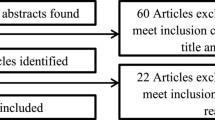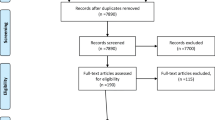Abstract
Objective
Patient-reported outcome measures (PROM) are frequently adopted to evaluate colorectal cancer (CRC) care, but the use of patient-reported experience measures (PREM) appears to be underdeveloped and not widely validated. This scoping review aims to understand the contexts for deployment of PREMs in CRC care, reliability of measures, gaps in current use of PREMs, and how PREMs are associated with PROMs when deployed together.
Methods
Four scientific databases (PubMed, CINAHL, PsycINFO, Scopus) were systematically searched from January 2011 to December 2023. Observational or interventional studies involving quantitative or mixed methodology with samples consisting CRC patients undergoing screening, treatment, or cancer surveillance and utilizing at least one PREM as an exposure or outcome were included.
Results
The initial search resulted in 10,400 records. Only 13 relevant studies (consisting of 17,105 participants) met the eligibility criteria. Utilization of PREMs was heterogenous across our sample and the CRC care continuum, and about half of the studies (53.8%) evaluated the relationship between PREMs and PROMs. PREM usage across the CRC care continuum largely focused on treatment/survivorship. Better care experience was positively associated with improved patient-reported outcomes.
Conclusions
Future work in CRC PREM development should focus on (1) establishing validated measures that aim to either capture disease/treatment-specific granularity or capitalize on applicability across care settings, (2) localizing novel or existing PREMs to consider different cultural contexts in healthcare, and (3) benchmarking associations between PREMs, PROMs, and other outcomes of interest.
Implications for Cancer Survivors
Individuals progressing through the CRC care continuum often undergo a multitude of procedures from detection and diagnosis to treatment and surveillance. The establishment of validated PREMs specific to CRC would help to benchmark and further improve the quality of care received—which should translate to better patient-reported outcomes—and serve as process indicators for institutions and providers to maintain rigorous health service delivery standard for CRC survivors.

Similar content being viewed by others
Data availability
All data supporting the findings can be found within our article.
References
Weldring T, Smith SM. Patient-reported outcomes (PROs) and patient-reported outcome measures (PROMs). Health Serv Insights. 2013;6:61–8.
Kingsley C, Patel S. Patient-reported outcome measures and patient-reported experience measures. BJA Education. 2017;17(4):137–44.
Kaplan RS, Porter ME. How to solve the cost crisis in health care. Harv Bus Rev. 2011;89(9):46–52 (56-61 passim).
Withers K, Palmer R, Lewis S, Carolan-Rees G. First steps in PROMs and PREMs collection in Wales as part of the prudent and value-based healthcare agenda. Qual Life Res. 2021;30(11):3157–70.
Colorectal cancer statistics. https://www.wcrf.org/dietandcancer/cancer-trends/colorectal-cancer-statistics. Accessed 6 Dec 2023.
Rudolph C, Petersen GS, Pritzkuleit R, Storm H, Katalinic A. The acceptance and applicability of a patient-reported experience measurement tool in oncological care: a descriptive feasibility study in northern Germany. BMC Health Serv Res. 2019;19(1):786.
Geessink NH, Schoon Y, Olde Rikkert MG, van Goor H. Training surgeons in shared decision-making with cancer patients aged 65 years and older: a pilot study. Cancer Manag Res. 2017;9:591–600.
Neilson LJ, Patterson J, von Wagner C, Hewitson P, McGregor LM, Sharp L, Rees CJ. Patient experience of gastrointestinal endoscopy: informing the development of the Newcastle ENDOPREM. Frontline Gastroenterol. 2020;11(3):209–17.
The Cancer Continuum. https://canceratlas.cancer.org/taking-action/cancer-continuum/. Accessed 6 Dec 2023.
Scanlon B, Brough M, Wyld D, Durham J. Equity across the cancer care continuum for culturally and linguistically diverse migrants living in Australia: a scoping review. Global Health. 2021;17(1):87.
Jackson GL, Zullig LL, Phelan SM, Provenzale D, Griffin JM, Clauser SB, Haggstrom DA, Jindal RM, van Ryn M. Patient characteristics associated with the level of patient-reported care coordination among male patients with colorectal cancer in the Veterans Affairs health care system. Cancer. 2015;121(13):2207–13.
Napoles AM, Santoyo-Olsson J, Stewart AL, Olmstead J, Gregorich SE, Farren G, Cabral R, Freudman A, Perez-Stable EJ. Physician counseling on colorectal cancer screening and receipt of screening among Latino patients. J Gen Intern Med. 2015;30(4):483–9.
Pollack CE, Rastegar A, Keating NL, Adams JL, Pisu M, Kahn KL. Is self-referral associated with higher quality care? Health Serv Res. 2015;50(5):1472–90.
Roydhouse JK, Gutman R, Keating NL, Mor V, Wilson IB. Differences between proxy and patient assessments of cancer care experiences and quality ratings. Health Serv Res. 2018;53(2):919–43.
Treiman K, McCormack L, Wagner L, Roach N, Moultrie R, Sanoff H, Bann C, Street RL Jr, Ashok M, Reeve BB. Factors affecting the communication experiences of newly diagnosed colorectal cancer patients. Patient Educ Couns. 2018;101(9):1585–93.
van Ryn M, Phelan SM, Arora NK, Haggstrom DA, Jackson GL, Zafar SY, Griffin JM, Zullig LL, Provenzale D, Yeazel MW, et al. Patient-reported quality of supportive care among patients with colorectal cancer in the Veterans Affairs Health Care System. J Clin Oncol. 2014;32(8):809–15.
Burton-Chase AM, Parker WM, Polivka KM, Gritz ER, Amos CI, Lu KH, Lynch PM, Rodriguez-Bigas MA, Nancy You Y, Peterson SK. A comparison between Lynch syndrome and sporadic colorectal cancer survivors’ satisfaction with their healthcare providers. Cancer Med. 2017;6(3):698–707.
Havyer RD, van Ryn M, Wilson PM, Bangerter LR, Griffin JM. Concordance of patient and caregiver reports on the quality of colorectal cancer care. J Oncol Pract. 2019;15(11):e979–88.
Durcinoska I, Young JM, Solomon MJ. Patterns and predictors of colorectal cancer care coordination: a population-based survey of Australian patients. Cancer. 2017;123(2):319–26.
Young JM, Durcinoska I, DeLoyde K, Solomon MJ. Patterns of follow up and survivorship care for people with colorectal cancer in new South Wales, Australia: a population-based survey. BMC Cancer. 2018;18(1):339.
Brotons A, Guilabert M, Lacueva FJ, et al. The colonoscopy satisfaction and safety questionnaire (CSSQP) for colorectal cancer screening: a development and validation study. Int J Environ Res Public Health. 2019;16(3):392. https://doi.org/10.3390/ijerph16030392.
Koreli A, Briassoulis G, Sideris M, Philalithis A, Papagrigoriadis S. Transanal endoscopic microsurgery (TEMS) for rectal cancer: patient decision-making, postoperative experience and quality of life. In Vivo. 2021;35(2):1235–45.
Drury A, Payne S, Brady AM. Identifying associations between quality of life outcomes and healthcare-related variables among colorectal cancer survivors: a cross-sectional survey study. Int J Nurs Stud. 2020;101:103434.
Jamieson Gilmore K, Corazza I, Coletta L, Allin S. The uses of Patient Reported Experience Measures in health systems: a systematic narrative review. Health Policy. 2023;128:1–10.
Hodson M, Andrew S, Michael Roberts C. Towards an understanding of PREMS and PROMS in COPD. Breathe. 2013;9(5):358–64.
Mooney K, Berry DL, Whisenant M, Sjoberg D. Improving cancer care through the patient experience: how to use patient-reported outcomes in clinical practice. Am Soc Clin Oncol Educ Book. 2017;37:695–704.
Modules. https://qol.eortc.org/modules/. Accessed 6 Dec 2023.
Pun JKH, Chan EA, Wang S, Slade D. Health professional-patient communication practices in East Asia: an integrative review of an emerging field of research and practice in Hong Kong, South Korea, Japan, Taiwan, and Mainland China. Patient Educ Couns. 2018;101(7):1193–206.
Foo C, Tan YL, Shrestha P, Eh KX, Ang IYH, Nurjono M, Toh SA, Shiraz F. Exploring the dimensions of patient experience for community-based care programmes in a multi-ethnic Asian context. PLoS One. 2020;15(11):e0242610.
Bull C, Callander EJ. Current PROM and PREM use in health system performance measurement: still a way to go. Patient Experience Journal. 2022;9(1):12–8.
Black N, Varaganum M, Hutchings A. Relationship between patient reported experience (PREMs) and patient reported outcomes (PROMs) in elective surgery. BMJ Qual Saf. 2014;23(7):534–42.
Athanatos L, Sandean DP, Burgula M, Lee B, Pandey R, Singh HP. Use of patient reported experience measure and patient reported outcome measures to evaluate differences in surgical or non-surgical management of humeral shaft fractures. Shoulder Elbow. 2023;15(2):140–50.
Bull C, Teede H, Watson D, Callander EJ. Selecting and implementing patient-reported outcome and experience measures to assess health system performance. JAMA Health Forum. 2022;3(4):e220326.
Bozic KJ. Improving value in healthcare. Clin Orthop Relat Res. 2013;471(2):368–70.
Male L, Noble A, Atkinson J, Marson T. Measuring patient experience: a systematic review to evaluate psychometric properties of patient reported experience measures (PREMs) for emergency care service provision. Int J Qual Health Care. 2017;29(3):314–26.
Funding
The authors declare that no funds, grants, or other support was received during the preparation of this manuscript.
Author information
Authors and Affiliations
Contributions
Jerrald Lau, Janelle Ng, Ning-Qi Pang, and Ker-Kan Tan conceptualized the study. Jerrald Lau, Janelle Ng, and Shi-Ying Tham contributed to the study design and search protocol. Lydia Li-Yeh Tan, Shi-Ying Tham, and Chee-Kee Ng performed the initial database search and screening of titles and abstracts. Jerrald Lau, Janelle Shaina Ng, and Daphne Lee reviewed the full texts and performed data extraction. Janelle Shaina Ng and Daphne Lee extracted and analyzed the data. Jerrald Lau, Janelle Shaina Ng, and Jarrod K-H Tan wrote and edited the first draft. All authors read, edited, and approved subsequent drafts and the final manuscript.
Corresponding author
Ethics declarations
Ethics approval
Not applicable.
Consent for publication
Not applicable.
Consent to participate
Not applicable.
Competing interests
The authors have no relevant financial or non-financial interests to disclose.
Additional information
Publisher's Note
Springer Nature remains neutral with regard to jurisdictional claims in published maps and institutional affiliations.
Rights and permissions
Springer Nature or its licensor (e.g. a society or other partner) holds exclusive rights to this article under a publishing agreement with the author(s) or other rightsholder(s); author self-archiving of the accepted manuscript version of this article is solely governed by the terms of such publishing agreement and applicable law.
About this article
Cite this article
Lau, J., Ng, J.S., Lee, D. et al. Use of patient-reported experience and outcome measures within the colorectal cancer care continuum: a scoping review. J Cancer Surviv (2024). https://doi.org/10.1007/s11764-024-01595-2
Received:
Accepted:
Published:
DOI: https://doi.org/10.1007/s11764-024-01595-2




